2020年1月浙江高考英语试题
2020 年浙江省高考英语试题(含答案)
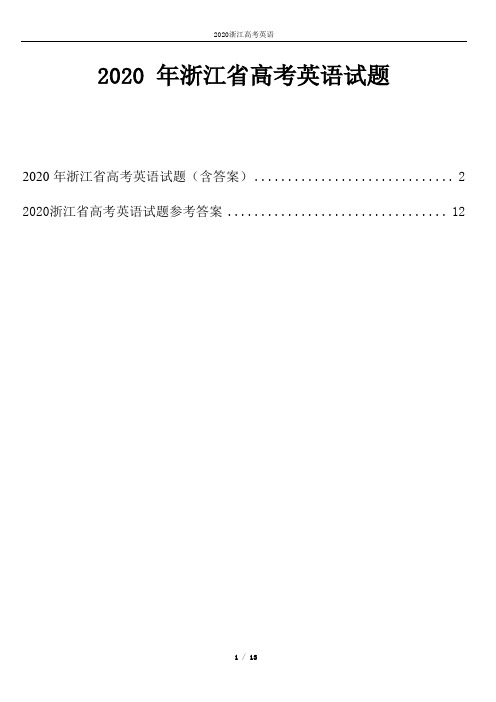
2020 年浙江省高考英语试题2020 年浙江省高考英语试题(含答案) (2)2020浙江省高考英语试题参考答案 (12)2020 年浙江省高考英语试题(含答案)选择题部分第一部分听力(共两节,满分30 分)做题时,先将答案标在试卷上。
录音内容结束后,你将有两分钟的时间将试卷上的答案转涂到答题纸上。
第一部分听力(共两节,满分30 分)做题时,先将答案标在试卷上。
录音内容结束后,你将有两分钟的时间将试卷上的答案转涂到答题卡上。
第一节(共5 小题;每小题 1.5 分,满分7.5 分)听下面5 段对话。
每段对话后有一个小题,从题中所给的A、B、C 三个选项中选出最佳选项。
听完每段对话后,你都有10 秒钟的时间来回答有关小题和阅读下一小题。
每段对话仅读一遍。
例:How much is the shirt?A. £19.15.B. £9.18.C. £9.15.答案是C。
1.What will the speakers do tonight?A.Visit Mary.B. Go out of town.C. Host a dinner.2.How does the woman go to work this week?A.By car.B. By bike.C. On foot.3.What time does Dave’s meeting start?A. At 8:30.B. At 9:00.C. At 10:00.4.What is Helen going to do?A.Buy some books.B. Study in the library.C. Attend a history class.5.What is the woman’s feeling now?A.Relief.B. Regret.C. Embarrassment.第二节(共15 小题;每小题 1.5 分,满分22.5 分)听下面5 段对话或独白。
2024年1月浙江省高考英语试题+答案详解

2024年1月浙江省高考英语试题+答案详解(试题部分)一、阅读理解Tom Sawyer Play Is an AdventureA 35-minute hand-clapping, foot-stomping musical version of a Mark Twain favorite returns with this Tall Stacks festival.“Tom Sawyer: A River Adventure” has all the good stuff, including the fence painting, the graveyard, the island and the cave. It is adapted by Joe McDonough, with music by David Kisor. That’s the local stage writing team that creates many of the Children’s Theatre of Cincinnati’s original musicals, along with the holiday family musicals at Ensemble Theatre.This year Nathan Turner of Burlington is Tom Sawyer, and Robbie McMath of Fort Mitchell is Huck Finn.Tumer, a 10th-grader at School for Creative and Performing Arts, is a familiar presence on Cincinnati’s stages. He is a star act or of Children’s Theatre, having played leading roles in “The Legend of Sleepy Hollow” and “The Wizard of Oz,” and is fresh from Jersey Production “Ragtime”.McMath is a junior at Beechwood High School. He was in the cast of “Tom Sawyer” when it was first performed and is a Children’s Theatre regular, with five shows to his credit. This summer he attended Kentucky’s Governor’s School for the Arts in Musical Theatre.Note to teachers: Children’s Theatre has a study guide demonstrating how math and science can be taught through “Tom Sawyer.” For downloadable lessons, visit the official website of Children’s Theatre.1.Who wrote the music for “Tom Sawyer: A River Adventure”?A.David Kisor.B.Joe McDonough.C.Nathan Turner.D.Robbie McMath.2.What can we learn about the two actors?A.They study in the same school.B.They worked together in ”Ragtime“.C.They are experienced on stage.D.They became friends ten years ago.3.What does Children’s Theatre provide for teachers?A.Research funding.B.Training opportunities.C.Technical support.D.Educational resources.When was the last time you used a telephone box? I mean to make an actual phone call — not to shelter from the rain. Ages ago, right? The last time I used a phone box for its intended purpose was…2006. I was conducting auditions (试演) for my play in my tiny old shared house in London. Hoping to impress some talented actors to come and work for me for nothing, I spread some throws over the sofas and lit candles to make it seem a bit more ”young professional”.As I rushed outdoors to empty the wastepaper baskets, the door swung shut behind me. Suddenly I was lockedoutside. My mobile phone was inside, but luckily there was a telephone box across the street. So, I called Directory Assistance, got put through to our landlady’s managing agent, and had a spare key sent to me with just enough time to get back in before the actors arrived.As it has been many years since I last used one, I should hardly be surprised that then are no longer any public telephones near my house. The last one standing has just been turn into a “mini community library”: any passer-by can “borrow” a book from its shelves return it later, or replace it with another title from their own collection.For a few months after the “library” opened, I didn’t bother taking a look, as I had assumed that it would be stuffed full of cheese love stories. Then I noticed fork conducting spring cleans dropping boxes of voluminous books on various subjects there. And these books were free. This unbeatable price-point encouraged me to experiment with dozens of titles that I would never normally consider buying. And I’ve discovered some great books!If I ever get trapped outside my house again, my local telephone box will, sadly no longer be able to connect me with my keys. But it can certainly keep me entertained while I wait for my wife to rescue me.4.What does the underlined word “it” in the first paragraph refer to?A.The play.B.The shared house.C.The sofa.D.The telephone box.5.Why did the author use the telephone box in 2006?A.To place an urgent call.B.To put up a notice.C.To shelter from the rain.D.To hold an audition.6.What do we know about the “mini community library”?A.It provides phone service for free.B.Anyone can contribute to its collection.C.It is popular among young readers.D.Books must be returned within a month.7.Why did the author start to use the “library”?A.He wanted to borrow some love stories.B.He was encouraged by a close neighbour.C.He found there were excellent free books.D.He thought it was an ideal place for reading.On September 7, 1991, the costliest hailstorm (雹暴) in Canadian history hit Calgary’s southern suburbs. As a result, since 1996 a group of insurance companies have spent about $2 million per year on the Alberta Hail Suppression Project. Airplanes seed threatening storm cells with a chemical to make small ice crystals fall as rain before they can grow into dangerous hailstones. But farmers in east-central Alberta — downwind of the hail project flights — worry that precious moisture (水分) is being stolen from their thirsty land by the cloud seeding.Norman Stienwand, who farms in that area, has been addressing public meetings on this issue for years. “Basically, the provincial government is letting the insurance companies protect the Calgary-Edmonton urban area from hail,” Mr.Stienwand says, “but they’re increasing drought risk as far east as Saskatchewan.”The Alberta hail project is managed by Terry Krauss, a cloud physicist who works for Weather Modification Inc. of Fargo, North Dakota. “We affect only a very small percentage of the total moisture in the air, so we cannot be causing drought.” Dr. Krauss says. “In fact, we may be helping increase the moisture downwind by creating wetter ground.”One doubter about the safety of cloud seeding is Chuck Doswell, a research scientist who just retired from the University of Oklahoma. “In 1999, I personally saw significant tornadoes form from a seeded storm cell in Kansas,” Dr. Doswell says. “Does cloud seeding create killer storms or reduce moisture downwind? No one really knows, of course, but the seeding goes on.”Given the degree of doubt, Mr. Stienwand suggests, “It would be wise to stop cloud seeding.” In practice, doubt has had the opposite effect. Due to the lack of scientific proof concerning their impacts, no one has succeeded in winning a lawsuit against cloud-seeding companies. Hence, private climate engineering can proceed in relative legal safety.8.What does the project aim to do?A.Conserve moisture in the soil.B.Forecast disastrous hailstorms.C.Prevent the formation of hailstones.D.Investigate chemical use in farming.9.Who are opposed to the project?A.Managers of insurance companies.B.Farmers in east-central Alberta.C.Provincial government officials.D.Residents of Calgary and Edmonton.10.Why does Dr. Doswell mention the tornadoes he saw in 1999?A.To compare different kinds of seeding methods.B.To illustrate the development of big hailstorms.C.To show the link between storms and moisture.D.To indicate a possible danger of cloud seeding.11.What can we infer from the last paragraph?A.Scientific studies have proved Stienwand right.B.Cloud-seeding companies will continue to exist.C.The doubt about cloud seeding has disappeared.D.Private climate engineering is illegal in Canada.The Stanford marshmallow (棉花糖) test was originally conducted by psychologist Walter Mischel in the late 1960s. Children aged four to six at a nursery school were placed in a room. A single sugary treat, selected by the child, was placed on a table. Each child was told if they waited for 15 minutes before eating the treat, they would be given a second treat. Then they were left alone in the room. Follow-up studies with the children later in life showed a connection between an ability to wait long enough to obtain a second treat and various forms of success.As adults we face a version of the marshmallow test every day. We’re not tempted by sugary treats, but by our computers, phones, and tablets — all the devices that connect us to the global delivery system for various types of information that do to us what marshmallows do to preschoolers.We are tempted by sugary treats because our ancestors lived in a calorie-poor world, and our brains developed a response mechanism to these treats that reflected their value — a feeling of reward and satisfaction. But as we’ve reshapedthe world around us, dramatically reducing the cost and effort involved in obtaining calories, we still have the same brains we had thousands of years ago, and this mismatch is at the heart of why so many of us struggle to resist tempting foods that we know we shouldn’t eat.A similar process is at work in our response to information. Our formative environment as a species was information-poor, so our brains developed a mechanism that prized new information. But global connectivity has greatly changed our information environment. We are now ceaselessly bombarded (轰炸) with new information. Therefore, just as we need to be more thoughtful about our caloric consumption, we also need to be more thoughtful about our information consumption, resisting the temptation of the mental “junk food” in order to manage our time most effectively.12.What did the children need to do to get a second treat in Mischel’s test?A.Take an examination alone.B.Share their treats with others.C.Delay eating for fifteen minutes.D.Show respect for the researchers.13.According to Paragraph 3, there is a mismatch between_______.A.the calorie-poor world and our good appetites B.the shortage of sugar and our nutritional needsC.the tempting foods and our efforts to keep fit D.the rich food supply and our unchanged brains14.What does the author suggest readers do?A.Be selective information consumers.B.Absorb new information readily.C.Use diverse information sources.D.Protect the information environment.15.Which of the following is the best title for the text?A.Eat Less, Read More B.The Later, the BetterC.The Marshmallow Test for Grownups D.The Bitter Truth about Early HumansIn the past few years, online learning has become a significant part of the university and college experience. 16 But are all online courses created equal? How can you be sure that digital learning is right for you? 17 We interviewed students and professors to get their advice about online courses, The most obvious advantage of online learning is that you can study anywhere and anytime. 18 “I think a point that many people lose sight of is how easy it can be to fall behind schedule,” says graduate student Amanda Bindman. Before choosing to study online, consider whether you’re a self-motivated learner and if the material seems interesting enough to keep you going.The tip that comes up most often is simple: build online courses into your weekly schedule, just like what you would do with in person courses. 19 He noted that his online students usually end up with lower grades. It is so easy to let an online course slide, but your grades will suffer as a result. Be sure to schedule set times to watch your lectures, read materials and contribute to online discussion boards.20 A social connection is often a big part of learning. There are things you can do to ease this problem. Jessica Pink, an undergraduate student, suggests taking online courses with a friend, so you can motivate each other to stay on track. You can also find students on the class discussion board to organize a study group, or schedule in-person meeting swith your professor to discuss course concepts.A.But that doesn’t mean there aren’t deadlines.B.Your motivation should be your main concern.C.Do you know that online courses are also part of your education?D.Professor Alex Davidson teaches the same course in person and online.E.The chief complain t about online courses is that they lack human interaction.F.If you take an online course, what can you do to ensure the best possible grade?G.A survey found that 29 percent of college students registered for online courses.二、完形填空While taking a 20-hour train ride along the edge of the Taklimakan Desert in northwestern China, I had the kind of humbling, educational, and above all else, wonderful 21 with a local that all travelers long for. A young Chinese man 22 me on the train. My 23 friend spoke virtually no English, so I happily took the 24 to practice my Chinese.Over several hours, he would tell me about how he had 25 a two-year professional school to quickly find a job 26 highways in order to help support his family. Perhaps the most 27 , however, was the fact that this man spent hours studying every day after hard physical labor. Without batting an eye, he would 28 a translated Emerson passage before asking about the literary influence of American 29 as a whole. ”And what do you all learn about Russian authors?” I 30 him asking at one point.It would have been easy to 31 my assumptions about this highway builder who had never been more than a few hundred miles from home. But this highly informed, 32 , and admirable person prevented me doing so. In the course of a couple of hours, he 33 me just how much one can gain from 34 with an open mind, and a willingness to 35 with locals from all walks of life.21.A.experiment B.encounter C.competition D.appointment22.A.treated B.saved C.lectured D.approached23.A.true B.so-called C.new D.long-lost24.A.chance B.advice C.trouble D.right25.A.visited B.financed C.attended D.founded26.A.building B.sweeping C.checking D.guarding27.A.typical B.obvious C.natural D.remarkable28.A.publish B.quote C.сорy D.download29.A.writers B.historians C.workers D.students30.A.anticipate B.imagine C.recall D.catch31.A.look into B.rely on C.go over D.deal with32.A.well-behaved B.multi-skilled C.warm-hearted D.self-educated33.A.asked B.warned C.showed D.promised34.A.traveling B.reading C.searching D.teaching35.A.cooperate B.side C.negotiate D.engage三、语法填空阅读下面短文, 在空白处填入1个适当的单词或括号内单词的正确形式。
2020年1月高考英语浙江卷真题解析(1)
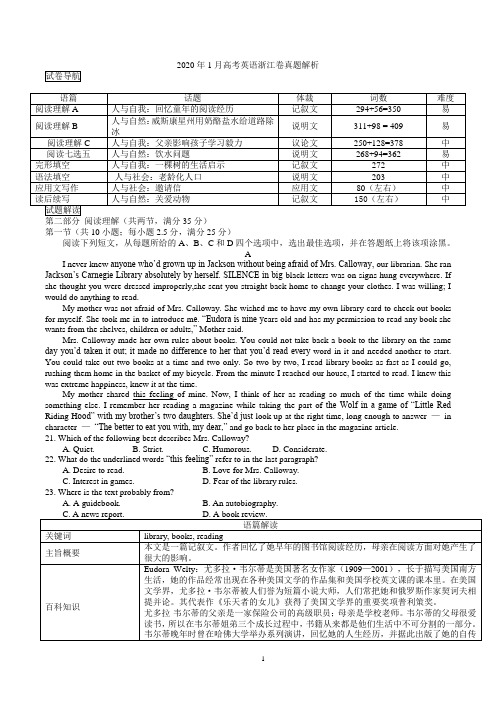
2020年1月高考英语浙江卷真题解析第一节(共10小题;每小题2.5分,满分25分)阅读下列短文,从每题所给的A 、B 、C 和D 四个选项中,选出最佳选项,并在答题纸上将该项涂黑。
AI never knew anyone who’d grown up in Jackson without being afraid of Mrs. Calloway , our librarian. She ran Jackson’s Carnegie Library absolutely by herself. SILENCE in big black letters was on signs hung everywhere. If she thought you were dressed improperly,she sent you straight back home to change your clothes. I was willing; I would do anything to read.My mother was not afraid of Mrs. Calloway. She wished me to have my own library card to check out books for myself. She took me in to introduce m e. “Eudora is nine y ears old and has my permission to read any book she wants from the shelves, children or adults,” Mother said.Mrs. Calloway made her own rules about books. You could not take back a book to the library on the same day you’d taken it out; it made no difference to her that you’d read every word in it and needed another to start. You could take out two books at a time and two only. So two by two, I read library books as fast as I could go, rushing them home in the basket of my bicycle. From the minute I reached our house, I started to read. I knew this was extreme happiness, knew it at the time.My mother shared this feeling of mine. Now, I think of her as reading so much of the time while doing something else. I remember her reading a magazine while taking the part of the Wolf in a game of “Little Red Riding H ood” with my brother’s two daughters. She’d just look up at the right time, long enough to answer — in character — “The better to eat you with, my dear,” and go back to her place in the magazine article.21. Which of the following best describes Mrs. Calloway?A. Quiet.B. Strict.C. Humorous.D. Considerate.22. What do the underlined words “this feeling” refer to in the last paragraph?A. Desire to read.B. Love for Mrs. Calloway.C. Interest in games.D. Fear of the library rules.23. Where is the text probably from?A. A guidebook.B. An autobiography.答案与解析21. B 推理判断题根据第一段中的If she thought you were dressed improperly, she sent you straight back hometo change your clothes.可知Mrs. Calloway对衣着严格要求以及第三段中她对图书借阅严格规定可知,Mrs.Calloway是一位严格的图书管理员。
2020年浙江省高考英语试卷(1月)(含详细解析)
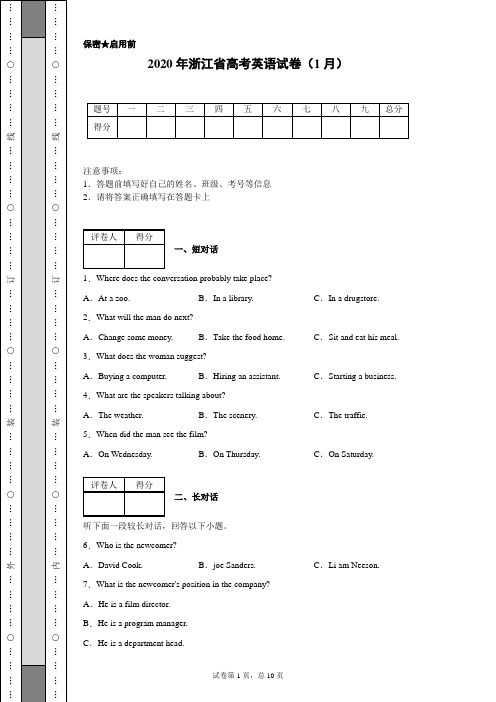
保密★启用前2020年浙江省高考英语试卷(1月)注意事项:1.答题前填写好自己的姓名、班级、考号等信息 2.请将答案正确填写在答题卡上 一、短对话1.Where does the conversation probably take place? A .At a zoo.B .In a library.C .In a drugstore.2.What will the man do next? A .Change some money.B .Take the food home.C .Sit and eat his meal.3.What does the woman suggest? A .Buying a computer.B .Hiring an assistant.C .Starting a business.4.What are the speakers talking about? A .The weather.B .The scenery.C .The traffic.5.When did the man see the film? A .On Wednesday. B .On Thursday. C .On Saturday.二、长对话听下面一段较长对话,回答以下小题。
6.Who is the newcomer? A .David Cook.B .joe Sanders.C .Li am Neeson.7.What is the newcomer's position in the company? A .He is a film director. B .He is a program manager. C .He is a department head.试卷第2页,总10页听下面一段较长对话,回答以下小题。
8.What does the woman do? A .She' a secretary.B .She' a hotel maid.C .She's a salesperson.9.What is the man going to do? A .Change the sheets.B .Have breakfast.C .Meet his friends.10.What does the man ask the woman to do at the end of the conversation? A .Take the plate away. B .Bring some towels.C .Turn on the light.听下面一段较长对话,回答以下小题。
高考英语真题读后续写5原题+翻译+练习2020年1月浙江卷

真题读后续写2020年1月浙江卷:小狗的陪伴一、试题呈现阅读下面短文,根据所给情节进行续写,使之构成一个完整的故事。
“I’m going to miss you so much, Poppy,” said the tall, thin teenager. He bent down to hug his old friend goodbye. He stood up, hugged his parents, and smiled, trying not to let his emotions (情绪) get the better of him.His parents were not quite able to keep theirs under control. They had driven their son several hours out of town to the university where he would soon be living and studying. It was time to say goodbye for now at least. The family hugged and smiled through misty eyes and then laughed.The boy lifted the last bag onto his shoulder, and flashed a bright smile. “I guess this is it,” he said. “I’ll see you back home in a month, okay?” His parents nodded, and they watched as he walked out of sight into the crowds of hundreds of students and parents. The boy’s mother turned to the dog, “Okay, Poppy, time to go back home.”The house seemed quiet as a tomb without the boy living there. All that week, Poppy didn’t seem interested in her dinner, her favorite toy, or even in her daily walk. Her owners were sad too, but they knew their son would be back to visit. Poppy didn’t.They offered the dog some of her favorite peanut butter treats. They even let her sit on the sofa, but the old girl just wasn’t her usual cheerful self. Her owners started to get worried. “What should we do to cheer Poppy up?” asked Dad. “We’ve tried everything.”“I have an idea, but it might be a little crazy,” smiled Mom. “Without anybody left in the house but us, this place could use a bit of fun. Let’s get a little dog for Poppy.”It didn’t take long before they walked through the front door carrying a big box. Poppy welcomed them home as usual, but when she saw the box, she stopped. She put her nose on it. Her tail began wagging (摆动) ever so slowly, then faster as she caught the smell.注意:1. 所续写短文的词数应为150左右;2.至少使用5个短文中标有下划线的关键词语;3.续写部分分为两段,每段的开头语已为你写好;4.续写完成后,请用下划线标出你所使用的关键词语。
2020年高考英语听力(浙江卷1月)听力试题,答案和录音材料
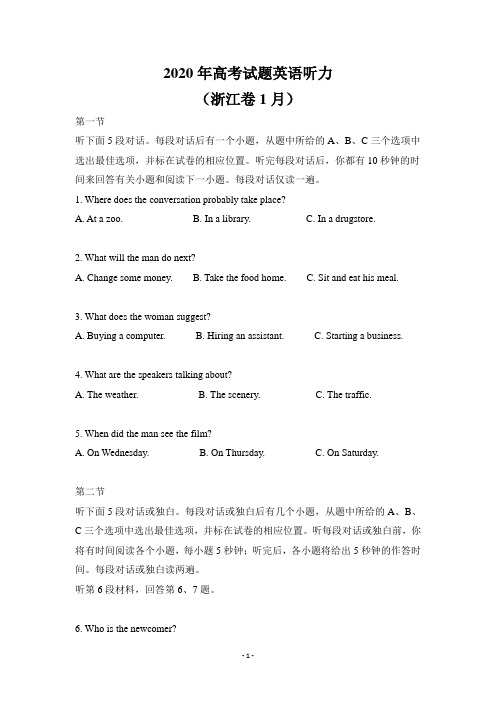
2020年高考试题英语听力(浙江卷1月)第一节听下面5段对话。
每段对话后有一个小题,从题中所给的A、B、C三个选项中选出最佳选项,并标在试卷的相应位置。
听完每段对话后,你都有10秒钟的时间来回答有关小题和阅读下一小题。
每段对话仅读一遍。
1. Where does the conversation probably take place?A. At a zoo.B. In a library.C. In a drugstore.2. What will the man do next?A. Change some money.B. Take the food home.C. Sit and eat his meal.3. What does the woman suggest?A. Buying a computer.B. Hiring an assistant.C. Starting a business.4. What are the speakers talking about?A. The weather.B. The scenery.C. The traffic.5. When did the man see the film?A. On Wednesday.B. On Thursday.C. On Saturday.第二节听下面5段对话或独白。
每段对话或独白后有几个小题,从题中所给的A、B、C三个选项中选出最佳选项,并标在试卷的相应位置。
听每段对话或独白前,你将有时间阅读各个小题,每小题5秒钟;听完后,各小题将给出5秒钟的作答时间。
每段对话或独白读两遍。
听第6段材料,回答第6、7题。
6. Who is the newcomer?A. David Cook.B. Joey Sanders.C. Liam Neeson.7. What is the newcomer’s position in the company?A. He is a film director.B.He is a program manager.C.C. He is a department head.听第7段材料,回答第8至10题。
浙江2020年1月普通高校招生选考科目试题。英语含答案
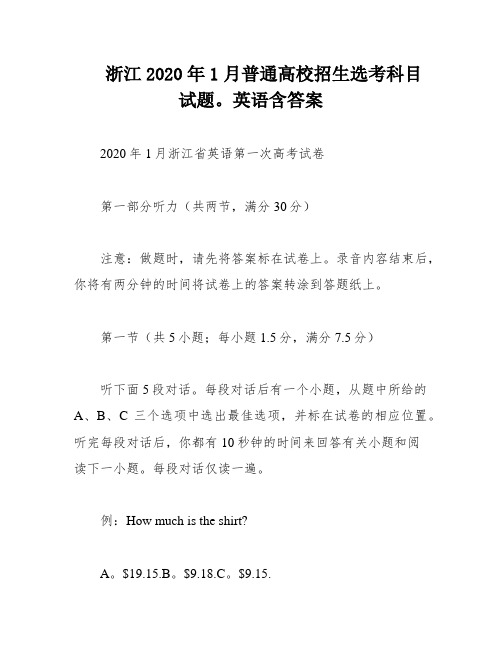
浙江2020年1月普通高校招生选考科目试题。
英语含答案2020年1月浙江省英语第一次高考试卷第一部分听力(共两节,满分30分)注意:做题时,请先将答案标在试卷上。
录音内容结束后,你将有两分钟的时间将试卷上的答案转涂到答题纸上。
第一节(共5小题;每小题1.5分,满分7.5分)听下面5段对话。
每段对话后有一个小题,从题中所给的A、B、C三个选项中选出最佳选项,并标在试卷的相应位置。
听完每段对话后,你都有10秒钟的时间来回答有关小题和阅读下一小题。
每段对话仅读一遍。
例:How much is the shirt?A。
$19.15.B。
$9.18.C。
$9.15.答案是C。
1.Where does the ___?A。
At a zoo。
B。
In a library。
C。
In a drugstore.2.What will the man do next?A。
Change some money。
B。
Take the food home。
C。
Sit and eat his meal.3.What does the woman suggest?A。
___.4.What are the ___?A。
The weather。
B。
The scenery。
C。
The traffic.5.When did the man see the film?A。
___.第二节(共15小题;每小题1.5分,满分22.5分)听下面5段对话或独白。
每段对话或独白后有几个小题,从题中所给的A、B、C三个选项中选出最佳选项,并标在试卷的相应位置。
听每段对话或独白前,你将有时间阅读各个小题。
每小题5秒钟;听完后,各小题将给出5秒钟的作答时间。
每段对话或独白读两遍。
听第6段材料,回答第6、7题。
6.Who is the er?A。
___.7.What is the er's n in the company?B.___.___.17.What does the man suggest to Leaney?A.___.B.To start her own business.___。
2020年1月浙江高考 英语试题 优化排版

英语测试第一部分阅读理解第一节(共10小题;每小题2.5分,满分25分)阅读下列短文,从每题所给的A、B、C和D四个选项中选出最佳选项,并在答题纸上将该项涂黑。
AI never knew anyone who’d grown up in Jackson without being afraid of Mrs. Calloway, our librarian. She ran Jackson’s Carnegie Library absolutely by herself. SILENCE in big black letters was on signs hung everywhere If she thought you were dressed improperly, she sent you straight back home to change your clothes. I was willing; I would do anything to read.My mother was not afraid of Mrs. Calloway She wished me to have my own library card to check out books for myself. She took me in to introduce me. “Eudo ra is nine years old and has my permission to read any book she wants from the shelves, children or adults,” Mother said.Mrs. Calloway made her own rules about books. You could not take back a book to the library on the same day you’d taken it out; it made no difference to her that you’d read every word in it and needed another to start. You could take out two books at time and two only. So two by two,I read library books as fast as I could go: rushing them home in the basket of my bicycle. From the minute reached our house, I started to read. knew this was extreme happiness, knew it at the time.My mother shared this feeling of mine. Now I think of her as reading so much of the time while doing something else. I remember her reading a magazine while taking the part of the Wolf in a game of “Little Red Riding Hood” with my brother’s two daughters. She’d just look up at the right time, long enough to answer-in character - “The better to eat you with, my dear,” and go back to her place in the magazine article.1. Which of the following best describes Mrs. Calloway?A. Quiet.B. Strict.C. Humorous.D. Considerate.2. What do the underlined words “this feeling” refer to in the last paragraph?A. Desire to read.B. Love for Mrs. Calloway.C. Interest in games.D. Fear of the library rules.3. Where is the text probably from?A. A guidebook.B. An autobiography.C. A news report.D. A book review.Milwaukee, Wisconsin, is road testing a new way to keep winter roads ice-free -by spreading on them cheese brine, the salty liquid used to make soft cheeses, like mozzarella.Wisconsin, also called “America’s Dairyland,” is famous for its cheese. The state produced 2.8 billion pounds of cheese last year! As a result, there was a lot of leftover cheese brine. Disposing of(处置)the brine can be expensive. So what should cheese makers do with the waste?Normally, towns use rock salt to de-ice streets. The salt l owers water’s freezing point, causing ice to melt(融化). But using cheese brine could help both cheese producers and cities save money, while keeping roads safe Cheese brine has salt in it, which, like the rock salt, helps lower water’s freezing point.In addition to saving money, cheese brine could also be a more eco-friendly option. Many people suspect that all the rock salt used every winter is harming the environment.Rock salt is made of sodium chloride, the same compound(化合物)in ordinary table salt. Sounds harmless, right? But while you probably add only a small amount of salt to your food, road crews spread about 20 million tons of salt on U. S. roads every year!The chemical washes off roads and goes into the ground. There it can pollute drinking water, harm plants, and eat away soil. By spreading cheese brine on streets before adding a layer of rock salt, Milwaukee may be able to cut its rock salt use by 30 percent.Cheese brine has a downside too a smell similar to that of bad milk. “I don’t really mind it,” Emil Norby told Modern Farmer magazine. He works for one of Wisconsin’s county highway commissions and came up with the idea of using cheese brine. “Our roads smell like Wisconsin!” he said.4. Why can cheese brine help keep winter roads ice-free?A. It is soft.B. It contains salt.C. It is warm.D. It has milk in it.5. What is benefit of using cheese brine on roads?A. Improving air quality.B. Increasing sales of rock salt.C. Reducing water pollution.D. Saving the cheese industry.6. Milwaukee’s new way to de-ice streets may be an example of __________.A. barking up the wrong treeB. putting the cart before the horseC. robbing Peter to pay PaulD. killing two birds with one stoneToday’s world is not an easy adjustment for young adults. A key skill set for success is persistence (毅力), characteristic that researchers say is heavily influenced by fathers. Researchers from Brigham Young University discovered that fathers are in a unique position to help their adolescent children learn persistence.BYU professors Laura Padilla-Walker and Randal Day arrived at these findings after following 325 American families over several years. And over time, the persistence gained through fathers led to higher achievement in school.“There are relatively few studies that stress the unique role of fathers,” Padilla-Walker said. “This research also helps to prove that characteristics such as persistence -- which can be taught -- are key to a child’s life success.”Researchers determined that dads need to practice an “authoritative” parenting style. Authoritative parenting is not authoritarian: rigid, demanding or controlling. Rather, an authoritative parenting style includes some of the following characteristics: children feel warmth and love from their father; responsibility and the reasons behind rules are stressed;children are given an appropriate level of autonomy (自主权).In the study, about 52 percent of the dads exhibited above-average levels of authoritative parenting. key finding is that over time, children raised by an authoritative father were significantly more likely to develop persistence, which leads to better outcomes in school.This particular study examined 11 to 14-year-olds living in two-parent homes. Yet the researchers suggest that single parents still may play a role in teaching the benefits of persistence, which is an avenue of future research.7. What is special about the BYU professors’ study?A. It centered on fa thers’ role in parenting.B. It was based on a number of large families.C. It analyzed different kinds of parenting styles.D. It aimed to improve kids’ achievement in school.8. What would an authoritative father do when raising his children?A. Ignore their demands.B. Make decisions for them.C. Control their behaviors.D. Explain the rules to them.9. Which group can be a focus of future studies according to the researchers?A. Single parents.B. Children aged from 11 to 14.C. Authoritarian fathers.D. Mothers in two-parent homes.10. Which of the following is the best title for the text?A. Three Characteristics of Authoritative FathersB. Key Skills for Young Adults to Succeed in FutureC. Children Tend to Learn Determination from FatherD. Family Relationship Influences School Performance第二节(共5小题;每小题2分满分10分)根据短文内容,从短文后的选项中选出能填入空白处的最佳选项。
- 1、下载文档前请自行甄别文档内容的完整性,平台不提供额外的编辑、内容补充、找答案等附加服务。
- 2、"仅部分预览"的文档,不可在线预览部分如存在完整性等问题,可反馈申请退款(可完整预览的文档不适用该条件!)。
- 3、如文档侵犯您的权益,请联系客服反馈,我们会尽快为您处理(人工客服工作时间:9:00-18:30)。
2020年1月普通高等学校招生全国统一考试(浙江卷)
英语
选择题部分
第一部分听力(共两节,满分30分)
做题时,先将答案标在试卷上。
录音内容结束后,你将有两分钟的时间将试卷上的答案转涂到答题卡
上。
第一节(共5小题;每小题 1.5分,满分7.5分)
听下面5段对话,每段对话后有一个小题,从题中所给的A、B、C三个选项中选出最佳选项,并标
在试卷的相应位置。
听完每段对话后,你都有10秒钟的时间来回答有关小题和阅读下一小题。
每段对话
仅读一遍。
例:How much is the shirt?
A. £19.15.
B.£9.18.
C.£9.15.
答案是C。
1. Where does the conversation probably take place?
A. At a zoo.
B. In a library.
C. In a drugstore.
2. What will the man do next?
A. Change some money.
B. Take the food home.
C. Sit and eat his meal.
3. What does the woman suggest?
A. Buying a computer.
B. Hiring an assistant.
C. Starting a business.
4. What are the speakers talking about?
A. The weather.
B. The scenery.
C. The traffic.
5. When did the man see the film?
A. On Wednesday.
B. On Thursday.
C. On Saturday.
第二节(共15小题,每小题 1.5分,满分22.5分)
听下面5段对话,每段对话后有一个小题,从题中所给的A、B、C三个选项中选出最佳选项,并标在试卷的相应位置。
听完每段对话后,你将有时间阅读各个小题,每小题5秒钟;听完后,各小题将给出5秒钟的作答时间。
每段对话或独白读两遍。
听第6段材料,回答第6、7题.
6. Who is the newcomer?
A. David Cook.
B. Joey Sanders.
C. Liam Neeson.
7. What is the newcomer's position in the company?
A. He is a film director.
B. He is a program manager.
C. He is a department head.
听第7段材料,回答第8至10题.
8. What does the woman do?
A. She's a secretary.
B. She's a hotel maid.
C. She's a salesperson.
9. What is the man going to do?
A. Change the sheets.
B. Have breakfast.
C. Meet his friends.
10. What does the man ask the woman to do at the end of the conversation?
A. Take the plate away.
B. Bring some towels.
C. Turn on the light.
听第8段材料,回答第11至13题.
11. Why does Jessica make the call?
A. To look for her passport.
B. To apply for a credit card.
C. To ask for the manager.
12. Where will Jessica go right after the phone call?
A. The bank.
B. Her home.
C. The supermarket.
13. How does the man sound?
A. Helpful.
B. Nervous.
C. Surprised.
听第9段材料,回答第14至17题.
14. What is the man doing?
A. Placing an order.
B. Selling insurance.
C. Conducting an interview.
15. What did Leaney study for a degree?
A. Finance.
B. Education.
C. Public Relations.
16. What is an advantage of a smaller business according to Leaney?
A. Greater contributions to the neighborhood.
B. Closer employer-employee relationship.
C. More flexibility in providing services.
17. What is Leaney's plan for the next two weeks?
A. To visit her parents.
B. To call her relatives.
C. To finish her work.
听第10段材料,回答第18至20题.
18. What is the purpose of the talk?
A. To present a prize.
B. To introduce a lecturer.
C. To recommend a hook.
19. Where is Russel working now?
A. in Oxford.
B. In Chicago.
C. In Virginia.
20. What does Russel think of sleep?
A. It's seldom studied.
B. It's just a waste of time.
C. It's of great importance.。
